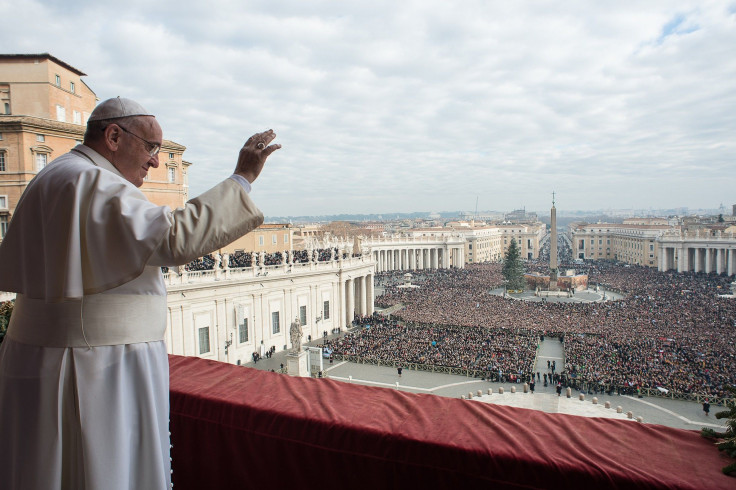Sri Lanka Braces For Pope Francis Visit Amid Political Turmoil

Despite protests from Roman Catholic leaders, Pope Francis has remained committed to his planned three-day trip to Sri Lanka on Jan. 13. The visit takes place five days after the country’s election, and some fear the results could end in violence.
“Individuals and groups may have expressed their views and concerns. But [the schedule] stands as it is,” Bishop Nobert Andradi of Anuradhapura, former secretary-general of the Sri Lankan Catholic bishops’ conference, told the Catholic News Service on Dec. 23. “Yes, everything is on track.”
The Vatican announced Pope Francis’ visit to the island nation on June 11, 2014. According to his schedule, Francis is expected to visit the presidential residence, make a speech to the bishops of Sri Lanka, and canonize the country’s first saint, Joseph Vaz, a 17th-century priest and missionary. He will also visit the Shrine of Our Lady of Madhu in Mannar, a district heavily affected by the 25-year civil war with Tamil Tiger rebels.
Presidential election
Problems arose with the pope’s visit when the presidential election was announced by President Mahinda Rajapaksa in late November. At first, Rajapaksa did not appear to have much competition for an unprecedented third term. His popularity stems from his victory over the Tamil Tiger rebels, who were defeated in 2009 after a 25-year civil war. However, within a day of the election’s announcement, the president’s health minister, Maithripala Sirisena, resigned, defected from the president’s ruling party and announced his candidacy.
Since then, 21 lawmakers and ministers have resigned to join Sirisena’s campaign. The United National Party, the main ethnic minority party, professional groups and some influential Buddhist monks have also vouched their support for Sirisena, making him a serious threat for the incumbent president, the Associated Press reported.
The political unrest has resulted in violence. On Monday, an unidentified gunman shot three opposition supporters who were helping set up a campaign meeting. Over the weekend, a volley of shots were heard at a Sirisena meeting as he was leaving the stage in his home district, Reuters reported. Two election officers were reportedly attacked in the eastern port district of Trincomalee by Rajapaksa supporters.
"Violence is on the rise and it seems to be a well-calculated strategy to prevent the opposition campaign," Keerthi Tennakoon, executive director of the Campaign for Free and Fair Election, told Reuters.His agency has received 157 complaints of violence and 1,201 violations of election law since the election was announced.
Push for postponement
While the country is predominately Buddhist, roughly 6 percent, or 20 million people, are Roman Catholics – enough to have some effect on the presidential elections.
At first Catholic leaders urged the pope to postpone his visit after posters bearing his image were displayed in Catholic communities across the country. Designed for Rajapaksa’s campaign, some posters showed the president with his wife meeting Francis at the Vatican in October. One banner suggested the pontiff supported Rajapaksa’s re-election. “With His Holiness’ blessings — you will be our president,” one poster read, according to the New York Times. On Dec. 1 the Archdiocese of Colombo asked Sri Lankan authorities to remove the posters that contained images of the pope and the Roman Catholic Church.
The debate entered the online realm when Catholic Church leaders and human rights advocates began blogging about Francis’ upcoming trip. The conversation created a divide among the religious leaders.
On Nov. 26, Fr. Leo Perera, who directs the Sri Lanka church's lay apostolate, wrote a letter to the bishops of Sri Lanka urging them to push for a postponement of the trip. (A lay apostolate is a group made up of Catholic lay people and Catholic religious people who are not members of the church's hierarchy but operate in cooperation with the church's hierarchy.)
“We know from experience that the period before and immediately after elections have been accompanied by violence,” he wrote ahead of a conference of Sri Lankan bishops in December. “Although His Holiness may not be concerned for his personal safety, his presence in a situation of turmoil and political strife, will invariably sully the image of the Papacy. If violence does occur, it can also lead to extremists terming Catholics as being anti-national if our concerns are diverted to the Papal visit.”
The candidates met with the Roman Catholic bishops at the conference on Dec. 12, where they were assured that there would be no violence regardless of the outcome, according to the Sri Lankan Catholic weekly newspaper Messenger.
"Both candidates said that whatever their status is after the elections, either as the winner or as the loser, they will both welcome the Holy Father when he steps down at the airport," Cardinal Malcolm Ranjith said.
But according to one of the country’s leading human rights advocates, Ruki Fernando, this may not be a promise they can keep. In the wake of past elections “large-scale violence” against opposition supporters took place.
“The main opposition candidate from the last Presidential Election in 2010 was jailed immediately after the elections. Fears have also been expressed that the incumbent may not hand over power even if an opposition candidate wins the elections,” he wrote in an article for groundviews.org.
In a public statement published Sunday in the Sri Lankan Catholic weekly newspaper Messenger, the Catholic Bishops Conference of Sri Lanka urged candidates and their supporters to promote a “peaceful atmosphere” during the pope’s visit and to avoid “any sort of “politicization” of the event.
© Copyright IBTimes 2024. All rights reserved.






















